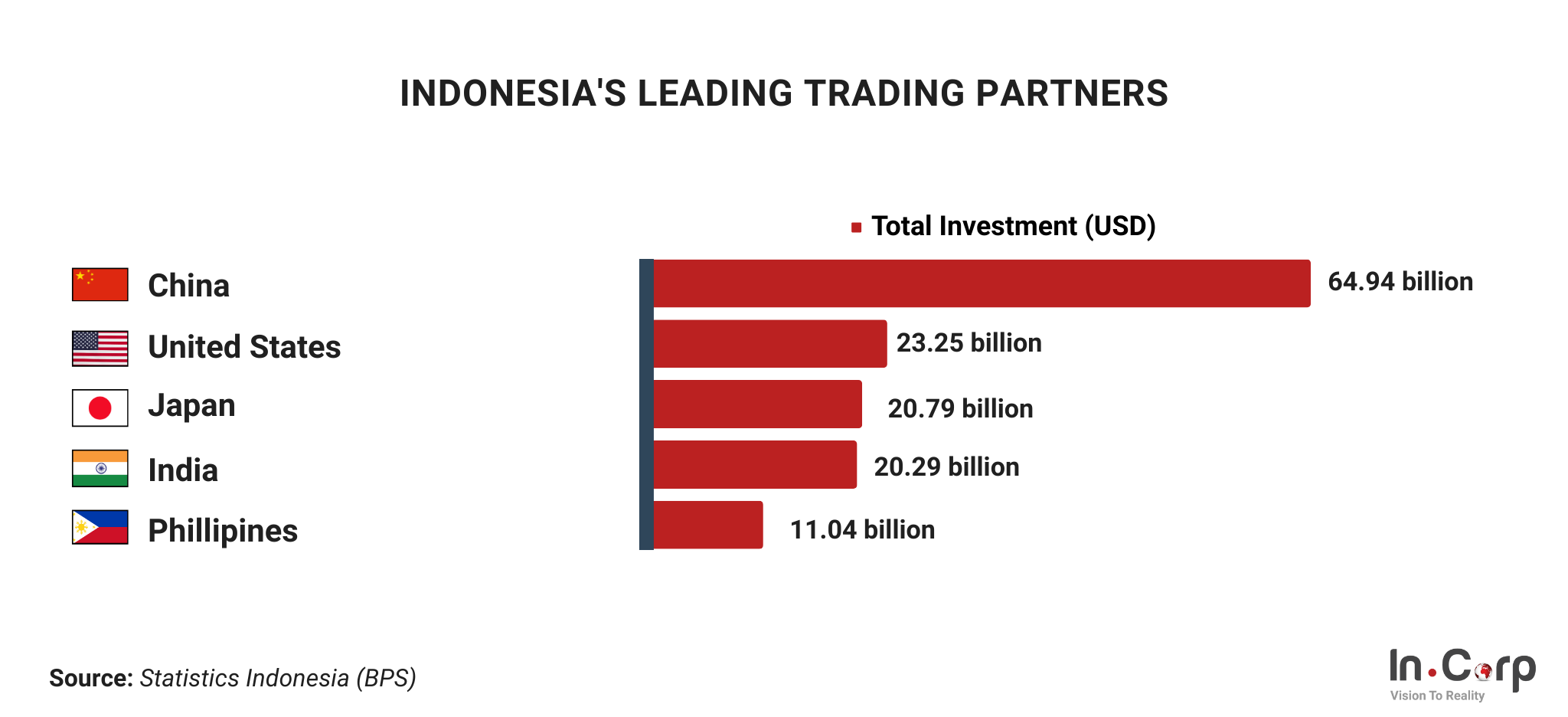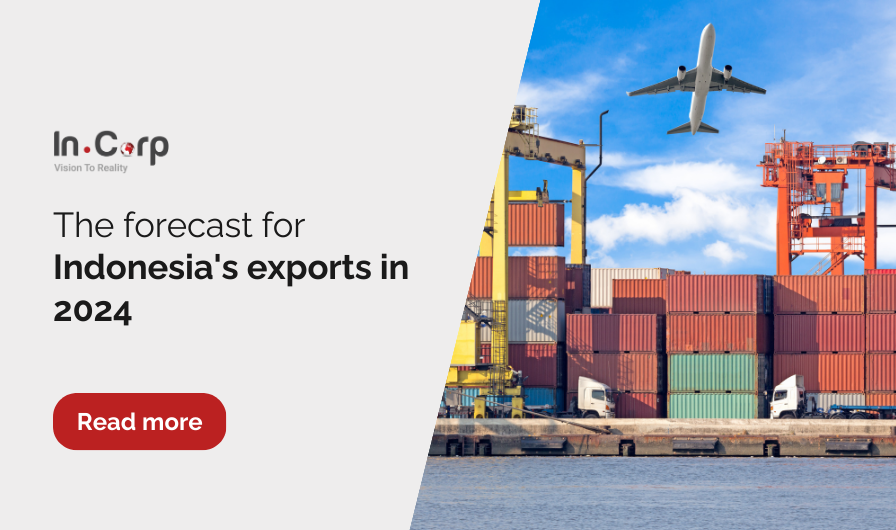As we look ahead to the economic landscape 2024, let’s take a moment to appreciate the diversity of Indonesia’s exports and their role in meeting global demands.
Indonesia’s export engine is truly impressive, from the mineral fuels that power modern industries to the iron and steel that build infrastructure around the world. Let’s explore the potential for this economic powerhouse and the positive impact it can have on the lives of people worldwide.
Insights into Indonesia’s export volume and growth
Statistics Indonesia (BPS) has announced that Indonesia’s exports for the year 2023 reached USD 258.2 billion, a decrease of 11.33% compared to the USD 291.90 billion recorded in 2022.
However, BPS noted that Indonesia’s exports for December 2023 amounted to USD 22.41 billion, 1.89% higher than November 2023, which stood at USD 22 billion.
According to BPS, the increase in December exports was driven by non-oil and gas exports, particularly mineral fuels, which rose by 10.07%, and local slag and ash, which increased by 37.37%.
Indonesia’s export outlook in 2024
The Ministry of Trade (Kemendag) projects that Indonesia’s exports will continue to grow in 2024. The projection for the export of goods and services in 2024 is a growth of 7.0%, reaching IDR 3,437 trillion. Moreover, non-oil and gas exports are estimated to grow between 3.3% and 4.5%.
Regarding trade performance, it is forecasted to range between USD 22.5 billion and 47.1 billion. Meanwhile, the service-to-gross Domestic Product (GDP) ratio is expected to grow by 1.8-2.0% in 2024.
Read more: Policies and prospects in Special Economic Zones in Indonesia
Indonesia’s leading trading partners

According to Statistics Indonesia (BPS), these five countries were the top destinations for Indonesian exports in 2023: China, the United States, Japan, India, and the Philippines.
Each nation has a strong appetite for specific Indonesian commodities, highlighting the diverse range of products driving the country’s export engine.
1. China
- Indonesia’s total exports to China in 2023 amounted to USD 64.94 billion, constituting 25.09% of the country’s total exports.
- The primary commodities exported to China include ferronickel, valued at USD 14.95 billion, lignite, coal, the liquid fraction of palm oil, nickel oxide sinters, and others.
2. United States
- Exports to the United States reached USD 23.25 billion, accounting for 8.98% of the total in 2023.
- Key commodities for this export include new pneumatic tires, electrical machines and apparatus, and refined palm oil.
3. Japan
- Exports to Japan accounted for USD 20.79 billion, making up 8.03% of the total exports in 2023.
- The major commodities exported to Japan involve bituminous coal, copper ores and concentrates, nickel mattes, and others.
4. India
- India secured the fourth position, with export value reaching USD 20.29 billion, contributing 7.84% of the total exports in 2023.
5. Philippines
- The Philippines is in fifth place, with exports valued at USD 11.04 billion, or 4.27% of the total.
Indonesia’s top 5 export commodities
According to the latest report by Statistics Indonesia (BPS), Indonesia has made significant strides in its export industry.
The report highlights the country’s top five export commodities for 2023, with a total export value of USD 258.2 billion. This underscores Indonesia’s potential to grow and become a top player in the global market.
1. Mineral fuels
- Mineral fuels (HS 27) were Indonesia’s most exported commodity, constituting 22.99% of the country’s total exports.
- China emerged as the primary destination for mineral fuel exports, accounting for 29.55%, valued at USD 17.58 billion. India followed, contributing USD 7.54 billion (12.67%), and Japan with USD 6.67 billion (11.21%).
2. Animal/vegetable fats and oils
- Another significant export was animal/vegetable fats and oils (HS 15), which totaled USD 28.45 billion and represented 10.99% of Indonesia’s total exports.
- The major export destination was China, amounting to USD 6.08 billion (21.37%).
3. Iron and steel
- Iron and steel were third among major exported commodities, with a value of USD 26.70 billion, contributing 10.32% to the total exports in 2023.
- The primary export destination was China, accounting for USD 18.34 billion (68.67%).
4. Machinery and electrical equipment
- Machinery and electrical equipment, along with their parts (HS 85), ranked fourth in terms of highest exports, reaching USD 14.35 billion and comprising 5.54% of the total.
- The United States was the leading export destination, contributing USD 3.46 billion (24.09%).
5. Vehicles and spare parts
- Vehicles and their parts (HS 87) emerged as the fifth highest exported commodity, valued at USD 11.15 billion, making up 4.31% of the total exports in 2023.
- The primary export destination for this commodity was the Philippines, with a share of 25.78% or USD 2.88 billion.
Unleash your growth potential with InCorp
The Ministry of Trade anticipates a robust performance for Indonesian exports in 2024, forecasting a 7.0% increase in overall trade and 3.3-4.5% growth for non-oil and gas exports.
Ready to tap into this dynamic export market? InCorp Indonesia is your trusted partner. We offer tailored solutions to help businesses of all sizes navigate the export process, from initial planning to market entry.
Kickstart your exporting journey today:
- Free consultation: Get expert advice and explore your options with a no-obligation consultation.
- Comprehensive services: We handle everything from company registration and licensing to logistics and market research.
- Proven expertise: Our team deeply understands the Indonesian export landscape and has a track record of success.
Let’s unlock your growth potential in the thriving Indonesian market by clicking the button below.
Get in touch with us.
What you'll get
A prompt response to your inquiry
Knowledge for doing business from local experts
Ongoing support for your business
Disclaimer
The information is provided by PT. Cekindo Business International (“InCorp Indonesia/ we”) for general purpose only and we make no representations or warranties of any kind.
We do not act as an authorized government or non-government provider for official documents and services, which is issued by the Government of the Republic of Indonesia or its appointed officials. We do not promote any official government document or services of the Government of the Republic of Indonesia, including but not limited to, business identifiers, health and welfare assistance programs and benefits, unclaimed tax rebate, electronic travel visa and authorization, passports in this website.



